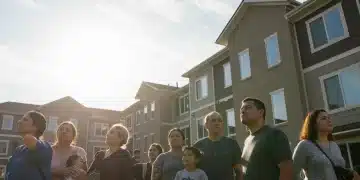Senior citizen housing subsidies: what you need to know

Senior citizen housing subsidies provide financial assistance to help seniors afford housing, ensuring they can live independently while reducing their financial burden and improving their quality of life.
Senior citizen housing subsidies play a crucial role in enhancing the living conditions of our elderly population. Are you aware of the diverse options available to you or your loved ones? Let’s explore how these programs can make a difference.
Understanding senior citizen housing subsidies
Understanding senior citizen housing subsidies is essential for helping elderly individuals secure stable living conditions. These subsidies can provide financial relief for many seniors facing housing costs that exceed their budgets.
What Are Housing Subsidies?
Housing subsidies are financial assistance programs designed to help low-income individuals pay for housing. For senior citizens, these subsidies can cover a portion of their rent or mortgage, making it easier to remain in their communities.
Types of Senior Housing Subsidies
Various types of senior citizen housing subsidies exist, each targeting different needs. Understanding these options can empower seniors to make informed decisions.
- Section 8 Housing Choice Voucher Program
- Low-Income Housing Tax Credit (LIHTC)
- Public Housing
These programs provide financial support and make housing affordable for those who qualify. Factors such as age, income, and specific needs play a vital role in determining eligibility.
Eligibility and Application Process
To apply for senior citizen housing subsidies, you must meet certain criteria. Generally, you need to provide proof of income and fall within age guidelines. The application process can vary, but most require you to fill out a form and supply necessary documentation.
Gathering documents like your income statements or identification can facilitate a smoother application experience. Don’t hesitate to seek assistance from local agencies or community organizations that specialize in helping seniors.
In many cases, waiting lists are involved, so it’s crucial to apply as early as possible. Being proactive can ensure you receive the help you need in a timely manner.
Overall, understanding senior citizen housing subsidies can greatly impact the quality of life for many elderly individuals. By exploring these options, seniors can find stable housing solutions tailored to their financial situations and needs.
Eligibility criteria for senior housing assistance
Eligibility criteria for senior housing assistance can vary significantly based on the specific program. Understanding these criteria is essential for seniors seeking financial relief in housing costs.
Common Eligibility Requirements
Most housing assistance programs have similar eligibility standards. Generally, programs consider age, income, and family size. Here are some key factors:
- Applicants typically need to be 62 years or older.
- Income must fall below a certain threshold to qualify.
- Household size is also taken into account for determining the appropriate assistance level.
Programs often require proof of income, such as tax returns or pay stubs. Additionally, applicants may need to supply identification or verification of age. Each program’s requirements will be detailed on their respective websites or through local housing authorities.
Special Considerations
For seniors with unique situations, various forms of assistance might be available. Veterans, for instance, may qualify for additional support programs specifically tailored for them. Similarly, those with disabilities may find alternative housing resources created to accommodate their needs.
Understanding these special considerations can help seniors identify the best program for their situations. Furthermore, seeking help from local agencies can clarify eligibility requirements and guide seniors through the application process.
How to apply for housing subsidies

Applying for housing subsidies can seem daunting, but understanding the steps can simplify the process. Knowing what to do and what to expect is essential for seniors seeking assistance.
Gather Necessary Documents
Before you start the application, it’s important to gather all required documents. Commonly needed documents include:
- Proof of income, such as pay stubs or tax returns.
- Identification, like a driver’s license or social security card.
- Proof of age, if required by the program.
Having these documents ready can speed up the application process. It’s also helpful to keep copies of everything you submit.
Contact Local Agencies
Next, reach out to local housing agencies or organizations specializing in senior assistance. They can provide specific information about available housing subsidies and how to apply. These organizations are often familiar with local programs and can help navigate the application process.
Visiting their websites can also offer insights into programs suited for your needs. Many agencies have resource guides that outline the types of subsidies available and application procedures.
Complete the Application
When you’re ready, start filling out the application forms. Be thorough and honest when providing information. Incomplete or incorrect applications can lead to delays or denial of assistance. After completing the forms, double-check for any needed signatures before submission.
It’s advisable to ask for help if you encounter challenges. Friends, family members, or social workers can guide you through this process and ensure your application is complete.
After submitting the application, maintain contact with the agency to check on its status. Knowing where your application stands can provide peace of mind. Each program may have its own processing time, so be patient while waiting for a response.
Top programs for senior citizen housing
There are several top programs available for senior citizen housing that can provide much-needed financial support. These programs vary in eligibility requirements and benefits, but they all aim to assist seniors in securing affordable housing.
Section 8 Housing Choice Voucher Program
The Section 8 program is one of the most popular options for seniors. This program allows eligible individuals to choose their housing while providing a subsidy to reduce rent costs. Seniors can live in privately owned homes, apartments, or even public housing.
Eligibility is based on income and family size, making it crucial for applicants to provide accurate financial details. This flexibility in housing options is a significant advantage of the program.
Low-Income Housing Tax Credit (LIHTC)
The LIHTC program encourages the development of affordable housing by providing tax credits to property owners. This directly helps seniors by increasing the availability of low-rent units.
- Income limits are often set below 60% of the area median income.
- Housing units must meet specific standards to ensure a safe living environment.
- These programs are usually managed by state housing agencies.
Public Housing
Public housing offers another avenue for low-income seniors to find affordable living situations. Managed by local housing authorities, public housing consists of government-owned properties that offer subsidized rent.
Applicants typically undergo a screening process to determine eligibility based on income and family composition. Public housing can be a lifeline for many seniors struggling with high housing costs.
Supportive Housing for the Elderly Program (Section 202)
This unique program provides capital advances to finance the development of supportive housing for seniors with low incomes. The idea is to create housing that not only provides shelter but also offers supportive services like meals and transportation.
Applicants must meet income eligibility requirements and are typically older adults needing assistance with daily activities. This program significantly enhances the quality of life for seniors by fostering independence while offering necessary support.
Overall, understanding these top programs for senior citizen housing can empower seniors to seek the assistance they need. Each program has distinct advantages and requirements, so it’s essential to explore the best options available in your area.
Impact of subsidies on community living
The impact of subsidies on community living for seniors is profound and multifaceted. These financial aids not only help individuals but also strengthen the entire community.
Increased Affordability
Housing subsidies make living costs more affordable for seniors, allowing them to allocate their limited resources effectively. By reducing housing expenses, seniors can spend more on other essential needs such as healthcare, food, and transportation. This shift in spending helps improve their overall quality of life.
Stronger Community Ties
When seniors can afford to remain in their homes or neighborhoods, community connections thrive. Subsidies help prevent displacement, allowing seniors to stay near family, friends, and local services. Each resident contributes to a vibrant social fabric, promoting interaction and support networks.
Seniors often engage in volunteer work, sharing their skills and wisdom with younger generations, which fosters mutual respect and understanding. This intergenerational support can enhance the emotional well-being of both seniors and community members.
Economic Benefits
Subsidies for senior housing can stimulate local economies by increasing consumer spending in the area. When seniors have more disposable income, they contribute to local businesses such as grocery stores, restaurants, and healthcare providers. This economic activity can enhance job opportunities, benefiting the entire community.
Furthermore, stable housing leads to reduced homelessness and poverty levels among seniors. With financial support, there is a significant decrease in the number of seniors struggling to afford rent or mortgage payments.
Access to Support Services
Subsidies often come with access to additional support services, including healthcare and social programs. These programs promote healthy aging and enhance the well-being of seniors. For instance, subsidized housing can be linked to services like meal delivery, transportation assistance, and health screenings.
By integrating these services into the housing framework, communities can foster environments where seniors thrive, both physically and mentally. This holistic approach to senior living enables them to maintain independence while receiving necessary assistance.
FAQ – Frequently Asked Questions about Senior Citizen Housing Subsidies
What are housing subsidies for seniors?
Housing subsidies for seniors provide financial assistance to help cover their housing costs, making it more affordable to live independently.
Who is eligible for senior housing subsidies?
Typically, seniors aged 62 and older with limited income may qualify for housing subsidies, but specific eligibility can vary by program.
How can I apply for senior housing subsidies?
To apply, gather necessary documents like proof of income and identification, then contact your local housing agency or complete an application online.
What types of programs are available for senior citizens?
Programs include Section 8 Housing Choice Vouchers, Low-Income Housing Tax Credits, Public Housing, and the Supportive Housing for the Elderly Program.





